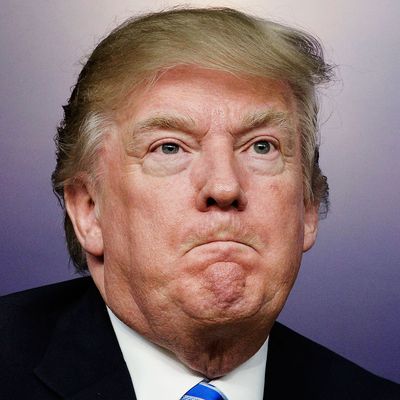
The Trump administration would like to permanently reduce the top tax rates on individual and corporate income. But there aren’t 60 votes in the Senate to do that. Thus, assuming the GOP can’t stomach nuking the legislative filibuster, it needs to pass its big tax-reform plan as a budget-reconciliation bill — a type of legislation that can pass the upper chamber with a simple majority vote.
But budget-reconciliation bills can’t increase the deficit outside of the ten-year window after they’re passed. Which means that, if Trump wants to permanently cut rates, he needs to close enough loopholes — or create enough new taxes — to make his rate-cut revenue neutral.
Alternatively, he could just do what George W. Bush did: Put a ten-year expiration date on a giant, deficit-expanding tax cut for the rich, and call it a day. After all, there’s no guarantee that a “permanent” tax cut would actually be permanent, anyway — Democrats could always regain the trifecta and return America to its present state of socialist tyranny.
One might think Trump would have the good sense to take option No. 2, especially after Trumpcare’s demise made revenue neutrality even harder to achieve — and made his administration even more desperate for a legislative victory.
But, at least for the moment, some in the White House aren’t ready to forfeit their dream of making the American tax system more regressive in perpetuity. And the quixotic search for new taxes that congressional Republicans would actually vote for has led the administration in some surprising directions.
Initially, the House GOP’s silver bullet was a border-adjustment tax (BAT) — effectively, a measure that would decrease the tax liability of American exporters while increasing that of importers. This would both provide Trump a (relatively) non-disruptive means of making America more protectionist and raise about $1 trillion in revenue, since America imports a lot more stuff than it exports.
But major retailers don’t like the BAT. And neither do many consumer groups, who view the tax as regressive. And a bevy of Republican senators has already vowed to kill the provision. So, now, the more moderate wing of the White House is, apparently, considering two other new taxes that will (almost certainly) never, ever pass. As the Washington Post reports:
President Trump’s administration is exploring the creation of two controversial new taxes — a value-added tax and a carbon tax — as part of a broad overhaul of the tax code, according to an administration official and one other person briefed on the process.
The value-added tax, which is popular in many other countries, would serve as a kind of national sales tax, one that consumers would pay when they make purchases and that businesses would pay for supplies, services and raw materials. A carbon tax would target the emissions of carbon dioxide and other greenhouses gases in the burning of gasoline, coal and other fossil fuels.
Shortly after the Post published its report, the White House denied that either proposal was under consideration (a claim that may ultimately hinge on one’s definition of consideration).
Anyhow, these alleged considerations may reflect the White House’s purported interest in bucking the GOP’s right flank and trying to win over moderate Democrats. After all, it’s hard to see the Freedom Caucus getting behind a tax on carbon dioxide. But there’s little reason to think that Democrats would be willing to support a deeply unpopular president’s deeply unpopular tax cut for the rich, for the sake of a carbon tax. (It’s also, obviously, hard to imagine that the president who called climate change a Chinese hoax — and just signed a bunch of executive orders rolling back Obama-era climate policies — is eager to pick a fight with his own party over taxing carbon.)
Similarly, it’s possible to conjure a context in which Democrats would support a value-added tax — if it were paired with a massive expansion in social spending and higher taxes on the rich, for example. But there’s no way Democrats are going to vote to simultaneously reduce taxes on billionaires and increase them on middle-class consumers. And that’s likely to be a bridge too far for plenty of congressional Republicans, too.
If Trump doesn’t want to see another major legislative priority die in utero, he should abandon the ambition of comprehensive tax reform, and either slash tax rates for ten years, or do a corporate-repatriation holiday paired with some infrastructure investment.
His understaffed, inexperienced White House can “explore” all the options it wants — but it (almost certainly) won’t find significant new sources of revenue that congressional Republicans are willing to vote for.






























